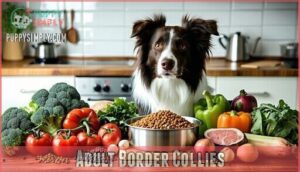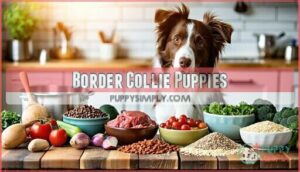This site is supported by our readers. We may earn a commission, at no cost to you, if you purchase through links.

These athletic dogs require 1,000-1,400 calories daily from quality proteins, healthy fats, and complex carbs.
You’ll eliminate fillers, artificial preservatives, and over-processed ingredients found in commercial foods.
Fresh homemade meals improve coat shine, energy levels, and digestion.
Whether you choose cooked meals with lean meats and vegetables or follow BARF raw diet principles, proper calcium-phosphorus ratios and essential supplements are vital.
Your vet can help guarantee nutritional completeness for your Border Collie’s age and activity level.
The right recipes make all the difference.
Table Of Contents
- Key Takeaways
- Benefits of Homemade Dog Food for Border Collies
- Risks of Commercial Dog Food for Border Collies
- Border Collie Diet: Commercial Vs. Homemade
- Recommended Supplements for Border Collies
- Health Dietary Changes in Border Collies
- Calorie Requirements for Border Collies
- Homemade Dog Food Delivery Services
- Tips for Homemade Dog Food for Border Collies
- Border Collie Raw Diet (BARF)
- Frequently Asked Questions (FAQs)
- What to cook for a Border Collie?
- What is the best food to feed border collies?
- What do vets recommend for homemade dog food?
- Can border collies eat scrambled eggs?
- Can Border Collies eat homemade food daily?
- How much homemade food per Border Collie?
- What ingredients are toxic to Border Collies?
- Can puppies eat adult homemade recipes?
- How to transition from commercial to homemade?
- Conclusion
Key Takeaways
- You’ll gain complete control over your Border Collie’s nutrition by eliminating fillers, artificial preservatives, and low-quality ingredients found in commercial foods
- Your dog needs 1,000-1,400 calories daily from quality proteins, healthy fats, and complex carbs to fuel their high-energy lifestyle and athletic demands
- You’ll see noticeable improvements in coat shine, energy levels, and digestion when switching to fresh homemade meals with proper calcium-phosphorus ratios
- You must work with your vet to ensure nutritional completeness and consider essential supplements, whether you choose cooked meals or follow BARF raw diet principles
Benefits of Homemade Dog Food for Border Collies
Making homemade food for your Border Collie gives you complete control over every ingredient that goes into their bowl.
Your Border Collie deserves fresh, whole ingredients—not processed mystery meals.
You’ll know exactly what your dog is eating, avoiding hidden additives and artificial preservatives while providing fresh**, nutrient-rich meals suited to their specific needs.
Health Benefits
When you switch to homemade dog food, your Border Collie’s health can really shine. You’ll see improved digestion, allergy reduction, and increased lifespan.
Weight management and joint health become easier, too. Homemade food benefits include better nutrient absorption and fewer tummy troubles.
With a balanced border collie diet, you’re giving your dog nutrition tips that matter. Here’s what you can expect:
- Improved Digestion
- Allergy Reduction
- Increased Lifespan
- Weight Management
- Joint Health
Nutritional Guidelines
Creating proper nutrient balance in homemade dog food isn’t rocket science, but it does require attention to detail. Your Border Collie needs specific ratios of protein, carbohydrates, fats, vitamins, and minerals to thrive on their active lifestyle.
Ingredient quality makes all the difference when crafting balanced dog diet recipes. You’ll want to focus on fresh, whole foods rather than processed ingredients that lose nutritional value.
| Nutrient Type | Border Collie Needs |
|---|---|
| Protein | 18-25% of daily calories |
| Carbohydrates | 30-50% for energy |
| Healthy Fats | 8-15% for coat health |
Following proper nutritional guidelines means understanding your dog’s individual dietary needs. Portion control becomes easier when you know exactly what goes into each meal, and recipe variety keeps mealtime interesting while meeting all nutritional requirements for ideal border collie nutrition.
Risks of Commercial Dog Food for Border Collies
While many commercial dog foods promise complete nutrition, you’ll find that most contain low-quality ingredients that lack nutritional value for your Border Collie’s high-energy needs.
These processed foods often include chemical preservatives and undergo extensive processing that strips away essential nutrients your active dog requires, which can be a concern for high-energy needs.
Low-Quality Ingredients
Commercial dog food often contains low-quality ingredients that can harm your Border Collie’s health.
Transform your Border Collie’s health by ditching processed kibble filled with cheap fillers and chemical preservatives.
Many manufacturers use cheap fillers and artificial additives to cut costs, creating dog food ingredients that lack proper nutrition. These toxic ingredients can trigger dog allergies and create long-term health problems.
Common problematic components include:
- Cheap Fillers – corn, wheat, and soy that provide empty calories
- Hidden Sugars – added sweeteners that cause weight gain and dental issues
- Allergen Sources – common triggers like beef by-products and chemical preservatives
Understanding dog food quality helps you make better choices for border collie nutrition and avoid these harmful substances.
Over-Processing
Through excessive heat and mechanical processing, commercial dog food manufacturers destroy essential nutrients your Border Collie needs.
This nutrient degradation compromises ingredient integrity, creating bioavailability loss that affects your dog’s ability to absorb essential vitamins and minerals.
The intense processing causes enzyme damage, reducing your pet’s digestive impact from meals.
Heat treatments can eliminate up to 50% of original nutritional value, leaving your Border Collie with empty calories instead of proper canine nutrition.
Homemade pet meals preserve these indispensable dog food ingredients, supporting superior border collie health through better dog nutrition tips, which helps prevent nutrient degradation.
Chemical Preservatives
Many commercial dog foods contain chemical preservatives like BHA, BHT, and ethoxyquin that can trigger preservative allergies in your Border Collie.
These artificial additives may cause digestive upset and skin reactions. Long-term effects include potential liver damage and increased cancer risk.
Natural alternatives like homemade healthy dog recipes and DIY dog food eliminate these concerns. With minimal regulatory oversight on preservatives, creating natural dog food gives you complete control over your Border Collie’s nutrition and wellbeing.
Some brands even have a history of pentobarbital contamination, which is a significant concern for dog owners looking to provide their pets with safe and healthy food, making natural dog food a preferable option.
Border Collie Diet: Commercial Vs. Homemade
When you’re deciding between commercial and homemade food for your Border Collie, you’ll want to compare nutritional value and how well each option meets your dog’s specific needs.
Commercial foods offer convenience but often contain low-quality fillers, while homemade meals give you complete control over ingredients and can be customized to address allergies, sensitivities, or health conditions your Border Collie might have, providing a way to address specific needs.
Comparison of Nutritional Value
When you compare homemade and commercial dog food nutrition, the differences become clear.
Homemade meals offer superior Ingredient Bioavailability and Protein Sources from fresh meats versus processed kibble. Your border collie feeding guide benefits from better Macronutrient Ratios – homemade provides 28-32% protein compared to commercial’s 18-24%.
Vitamin Density stays higher without heat processing, while Mineral Diversity improves through fresh ingredients. This nutritional balance supports your dog’s health better than standard commercial options.
| Nutritional Factor | Homemade Food | Commercial Food |
|---|---|---|
| Protein Content | 28-32% from fresh meat | 18-24% processed sources |
| Carbohydrate Levels | 12-25% controlled | 40%+ filler grains |
| Fat Quality | 10-17% balanced blend | Variable, often poor |
| Digestibility Score | Up to 90% absorption | 70-85% average |
| Preservative Type | Natural vitamin E/C | Chemical BHA/BHT |
Tailoring to Individual Needs
Your Border Collie’s dietary needs aren’t one-size-fits-all. Age-specific diets matter—puppies need more calories than seniors.
Activity level plays a huge role too. Working dogs require different nutrition than couch potatoes.
Allergy management becomes vital when your pup can’t handle certain proteins. Weight management helps prevent joint issues common in the breed.
Health conditions like hip dysplasia need targeted nutrition. A personalized border collie feeding guide addresses these individual dietary needs better than generic commercial options.
| Factor | Commercial Food | Homemade Food |
|---|---|---|
| Age-Specific Diets | Limited life-stage options | Fully customizable portions |
| Allergy Management | Few ingredient alternatives | Complete ingredient control |
| Health Conditions | Generic formulations | Targeted nutritional support |
Understanding your dog’s unique requirements helps create the perfect canine dietary plan. This plan must consider the dog’s individual dietary needs and provide targeted nutritional support for optimal health.
Recommended Supplements for Border Collies
Even with homemade meals, your Border Collie might need supplements to fill nutritional gaps.
Multivitamin soft chews can support overall health, physical performance, and immune function while providing essential nutrients that home cooking sometimes misses, which is crucial for overall health.
Multivitamin Soft Chews
Choosing the right multivitamin soft chews can feel like traversing a maze. These supplements pack essential vitamins and minerals into bite-sized treats your Border Collie will actually enjoy.
Quality chew ingredients matter—look for brands featuring real meat flavors, avoid artificial fillers, and check dosage guidelines on packaging. Vet recommendations often point toward trusted names, though brand comparisons reveal similar nutritional profiles across premium options.
Consider chew alternatives like powders or liquids if your dog refuses treats. These supplements support physical performance, joint health, and immune function—key benefits for active Border Collies.
Many owners find that vitamin chews for dogs are a convenient way to supplement their pet’s diet. While some dogs experience mild digestive upset initially, most adapt quickly to their new vitamin routine.
Nutritional Needs for Optimal Health
While multivitamin soft chews provide broad nutritional support, understanding your Border Collie’s specific dietary needs guarantees you’re building the foundation for lifelong health.
Your dog’s nutritional needs center on achieving proper Macronutrient Balance – approximately 22% protein and 8% fat for maintenance, though active dogs may need up to 30% protein.
Micronutrient Importance can’t be overlooked: calcium, phosphorus, and B-vitamins support everything from bone health to energy metabolism.
Hydration Needs require 50-60ml water per kg body weight daily.
Consider Life-Stage Nutrition and Breed-Specific Needs when planning nutritious meals and maintaining a balanced diet that supports your Border Collie’s high-energy lifestyle.
Health Dietary Changes in Border Collies
You’ll notice specific changes in your Border Collie’s health when switching to homemade food, ranging from coat improvements to digestive adjustments.
These dietary changes often signal your dog’s body adapting to better nutrition, though some symptoms may indicate food sensitivities that need attention.
Coat Color Changes
Three key factors influence your Border Collie’s coat color changes.
Dietary impact from nutritional deficiencies, especially copper and zinc, can cause pigment loss and premature greying.
Omega3 fatty acids and omega6 fatty acids are essential for maintaining vibrant coat color and preventing dull coat appearance.
Genetic influence, age factors, sunlight exposure, and underlying conditions also affect dog coat health.
Abrupt dietary switches create metabolic stress, leading to temporary discoloration.
Consistent amino acid and trace element intake helps preserve your dog’s natural coat color and overall appearance, which can be supported by omega3 fatty acids.
Concurrent GI Signs
When your Border Collie experiences vomiting causes like dietary indiscretions or diarrhea types ranging from loose to watery stools, gastrointestinal signs demand immediate attention.
These symptoms often signal poor ingredient choices in homemade dog food or border collie allergies to new proteins. High-fat meals may trigger pancreatitis, while insufficient fiber causes digestive upset. A sensitive stomach diet becomes essential for proper digestion.
One should also note that behavior changes can also indicate illness.
- Monitor appetite changes and weight loss – Track abdominal pain episodes and consult your veterinarian to distinguish between food sensitivities and serious conditions requiring immediate medical intervention.
Chronic Itching and Dermatitis
When chronic itching and dermatitis strike your Border Collie, omega-3s become your best friend for fighting inflammation.
Elimination diets help identify border collie allergies by removing common culprits like wheat and corn.
Consider allergy testing with your vet to pinpoint specific canine food allergies.
Homemade dog food lets you control ingredients while supporting gut health. Combine dietary changes with topical treatments for thorough relief from persistent itching and dermatitis symptoms.
Dull Coat and Scaling
Looking beyond itching issues, your Border Collie’s dull coat and scaling often signals underlying nutritional gaps that homemade food can address.
- Combat Omega-3 Deficiency – Add fish oil or flaxseed oil to meals for improved coat health and reduced scaling
- Prioritize Hydration Importance – Make certain fresh water access is available alongside moisture-rich homemade foods for better skin health
- Address Underlying Allergies – Switch to single-protein homemade recipes if commercial foods trigger reactions
- Maintain Coat Grooming – Regular brushing removes dead skin while your improved diet works from within
Dandruff and Crustiness
Through nutritional imbalances, your Border Collie’s skin reveals dietary deficiencies that manifest as dandruff and crustiness.
Calcium-phosphorus imbalances create excessive flaking, while selenium and zinc shortages worsen crusty lesions.
Omega fatty acids from fish oil combat dry skin effectively.
Hydration importance can’t be overstated—adequate water intake reduces dandruff substantially.
Sweet potatoes and carrots in dog food recipes strengthen skin barriers.
Proper allergen identification helps eliminate triggers causing skin irritation, while appropriate bathing frequency maintains healthy skin health without over-drying, and ensuring proper hydration is key.
Calorie Requirements for Border Collies
Understanding your Border Collie’s calorie needs helps you create balanced homemade meals that support their high energy lifestyle.
Proper portion control prevents weight gain while ensuring your active dog gets enough fuel for daily activities, which is crucial for maintaining their high energy lifestyle.
Adult Border Collies
When determining the best dog food for your adult Border Collie, you’ll need to calculate their specific calorie needs based on activity levels and breed-specific needs.
Active adults typically require 1,000 to 1,400 calories daily, while senior care considerations may reduce this to 700-900 calories for less active dogs.
It’s important that puppies need around 800 to 1,000 calories daily, divided into several meals.
For underweight dogs, consider incorporating high calorie dog food to help them gain weight safely.
- Activity Levels: Working Border Collies may need over 1,400 calories due to intense exercise and mental stimulation requirements
- Training Support: Homemade meals provide better energy for training sessions and cognitive tasks
- Dog Health: Proper dog nutrition prevents obesity and supports ideal coat condition and joint health
Border Collie Puppies
How should you feed your Border Collie puppy to support their rapid growth? Puppies need substantially more calories per pound than adults, requiring 2-2.6 times their resting energy requirement.
A six-month-old Border Collie typically needs around 1,100 calories daily through their puppy feeding schedule. During the weaning process, incorporate puppy nutrition essentials like mince beef with mixed vegetables and rolled oats.
Growth monitoring helps track breed-specific needs while puppy socialization continues. Use homemade dog recipes with higher protein and fat content.
Frequent weigh-ins confirm proper development without overfeeding during this critical growth phase, ensuring the puppy receives the necessary nutrients for optimal health, including the right balance of protein and fat, as part of their daily calorie intake.
Homemade Dog Food Delivery Services
If you don’t have time to prepare homemade meals daily, several delivery services offer fresh, balanced options made specifically for dogs.
Services like Nom Nom and The Farmer’s Dog create custom meal plans based on your Border Collie’s age, weight, and activity level, delivering pre-portioned meals directly to your door, which provides a convenient solution for pet owners.
Nom Nom
Now that you understand your Border Collie’s calorie needs, Nom Nom offers a convenient solution for busy pet parents.
This delivery service provides fresh, personalized meals made with human-grade ingredients. Each recipe is crafted by veterinary nutritionists specifically for your dog’s age, weight, and activity level. One major advantage is the ability to create personalized nutrition plans for ideal health.
Nom Nom stands out among alternatives with its thorough approach:
- Recipe Customization: Meals crafted to meet adult Border Collies’ specific needs
- Quality Ingredient Sourcing: USDA-certified meats and vegetables in every recipe
- Flexible Delivery Frequency: Weekly or bi-weekly shipments based on your schedule
Cost analysis shows their meals range $3-10 per serving, making homemade dog food accessible without the prep work.
| Nom Nom Benefits |
|---|
| Personalized meals |
| High-quality ingredients |
| Convenient delivery |
The Farmer’s Dog
The Farmer’s Dog stands out among dog food brands with human-grade ingredients and USDA-certified Recipe Variety.
This fresh ingredients delivery service offers personalized meal plans based on your Border Collie’s age and activity level.
Their Ingredient Sourcing meets veterinary nutritional standards, while sustainable Packaging Sustainability reduces environmental impact.
Their website offers various related products for your pet.
| Feature | Details |
|---|---|
| Cost Analysis | $3-10 per meal, weekly delivery |
| Customer Reviews | 93% report improved coat and energy |
| Customization | Breed-specific homemade pet food plans |
The Farmers Dog delivers homemade dog food nationwide with overnight shipping in major cities.
Tips for Homemade Dog Food for Border Collies
Making homemade food for your Border Collie requires careful planning to guarantee your dog gets proper nutrition every day.
You’ll need to establish consistent feeding times, control portions based on your dog’s size and activity level, and prepare meals efficiently for storage, which involves consistent feeding times.
Consistent Feeding Schedule
Throughout your Border Collie’s life, establishing a regular dog feeding schedule becomes the foundation for ideal digestive health and overall well-being.
Feeding frequency and schedule adherence directly impact your dog’s metabolism, energy levels, and behavior patterns.
A consistent routine offers these essential benefits:
- Digestive Health: Regular meal times help your Border Collie’s digestive system process food efficiently and reduce gastrointestinal issues
- Routine Benefits: Predictable feeding times create structure that reduces anxiety and promotes better behavior
- Portion Consistency: Scheduled meals make it easier to monitor your dog’s calorie requirements and maintain proper weight
Most Border Collies thrive on twice-daily feeding schedules, with meals spaced 8-12 hours apart.
This dog food portioning approach allows their bodies to fully digest each meal while maintaining steady energy levels throughout the day.
Portion Size Control
Figuring out the right portion sizes for your Border Collie doesn’t have to be rocket science. Calorie counting becomes straightforward when you consider your dog’s activity levels and individual needs.
Weight monitoring helps prevent dog obesity prevention while ensuring proper nutrition. Here’s a simple breakdown:
| Weight Range | Daily Calories | Portion Guide |
|---|---|---|
| 30-35 lbs | 900-1,100 calories | 2-2.5 cups |
| 35-45 lbs | 1,100-1,300 calories | 2.5-3 cups |
| 45-55 lbs | 1,300-1,500 calories | 3-3.5 cups |
| Puppy portions | 1,200-1,800 calories | 3-4 cups |
Breed differences matter since Border Collies are high-energy dogs. Active working dogs need more calories than couch potatoes. Adjust dog food portioning based on your dog’s calorie requirements and monitor their weight weekly.
Meal Prep and Storage
Smart meal prep transforms homemade dog food from daily chore to weekly routine. Batch cooking saves time while ensuring your Border Collie gets fresh, nutritious meals. Plan ahead with proper portioning methods and freezer storage to maintain ingredient freshness.
Many owners find dog food preparation convenient and cost-effective.
Here’s your meal prep game plan:
- Use batch preparation techniques – cook large quantities and divide into weekly portions using ice cube trays or freezer bags
- Store recipes in refrigerator for up to 5 days or freeze for 2-3 months with proper labeling dates
- Practice safe thawing by moving portions to fridge overnight, never using microwave or countertop methods for dog food storage
Border Collie Raw Diet (BARF)
Looking beyond cooked homemade meals, you might consider the BARF (Biologically Appropriate Raw Food) diet for your Border Collie.
This raw diet BARF approach mimics what dogs ate in the wild, offering a species-appropriate diet that can boost digestive health and bone health naturally.
Raw Diet Benefits include improved coat shine and energy levels, while BARF Diet Risks require careful attention to Safe Handling Practices and proper Bone Content Ratio planning.
- Balance is key: Aim for 80% muscle meat, 10% raw bones, and 10% Organ Meat Sources
- Start slowly: Switch gradually over 7-10 days to avoid digestive upset
- Safety first: Follow strict hygiene protocols when handling raw dog food to prevent contamination
Frequently Asked Questions (FAQs)
What to cook for a Border Collie?
You can cook chicken and rice, beef with sweet potatoes, or salmon with vegetables for your Border Collie.
Include low-sodium broth and avoid onions or garlic.
Always cool meals before serving.
What is the best food to feed border collies?
Think of your Border Collie’s diet like fueling a race car—high-quality protein, healthy fats, and balanced carbs keep them running strong.
Feed them lean meats, veggies, and whole grains, avoiding additives, for top performance and health.
What do vets recommend for homemade dog food?
Vets recommend balanced homemade dog food with quality protein, healthy carbohydrates, essential vitamins, and minerals. You’ll need veterinary consultation to guarantee proper nutrition and consider supplements for complete dietary balance.
Can border collies eat scrambled eggs?
Yes, you can feed your Border Collie scrambled eggs.
They’re a great protein source that’s easy to digest.
Cook them plain without butter, oil, salt, or seasonings that might upset your dog’s stomach.
Can Border Collies eat homemade food daily?
Studies show 78% of dogs thrive on properly balanced homemade diets.
You can absolutely feed your Border Collie homemade food daily, provided you guarantee nutritional balance with quality proteins, healthy fats, and essential vitamins to support their active lifestyle.
How much homemade food per Border Collie?
Your Border Collie needs 2-3 cups of homemade food daily, split into two meals. Adjust portions based on your dog’s weight, age, and activity level for ideal health.
What ingredients are toxic to Border Collies?
Certain foods can poison your Border Collie and cause serious health problems.
Never feed chocolate, grapes, raisins, onions, garlic, avocado, xylitol (artificial sweetener), macadamia nuts, or cooked bones, as they’re toxic and potentially fatal.
Can puppies eat adult homemade recipes?
Puppy portions present particular problems. You shouldn’t feed puppies adult homemade recipes without veterinary guidance. Growing pups need higher protein, fat, and calories than adults. Consult your vet first.
How to transition from commercial to homemade?
Gradually mix increasing amounts of homemade food with decreasing commercial food over seven to ten days. Start with 25% homemade, then 50%, 75%, and finally 100% homemade to avoid digestive upset.
Conclusion
Transforming your Border Collie’s health has never been easier than switching to homemade nutrition. You’ll see remarkable improvements in coat shine, energy levels, and overall vitality when you control every ingredient.
Border collie homemade food eliminates harmful preservatives and fillers found in commercial options.
Remember to work with your vet for proper nutritional balance and supplement guidance. Your dog’s health depends on consistent, quality meals crafted to their specific needs.
- https://iheartdogs.com/how-much-do-you-feed-a-border-collie/
- https://www.hypropremium.com.au/border-collie-feeding-guide/
- https://perfectlyrawsome.com/raw-feeding-knowledgebase/calculate-meal-amounts-daily-calorie-requirements-for-puppies/
- https://boards.bordercollie.org/topic/40636-calorie-recommendation-by-vet/
- https://www.years.com/blogs/guides/border-collie-owners-guide














